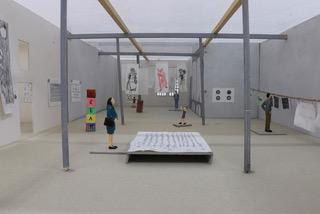
THE OPEN DOOR Group Exhibition
Dates : Dimanche 7 avril 2024 - Dimanche 2 juin 2024
Vernissage : Vernissage sam 6 avr 2024, 18:00
Adresse : Lieu d’Art Contemporain (L.A.C.) , 1 Rue de la Berre – Hameau du Lac, 11130 Sigean
Lieu d’Art Contemporain (L.A.C.)
1 Rue de la Berre – Hameau du Lac
11130 Sigean
France
Description, horaires...
Lieu d’Art Contemporain (L.A.C.) opens its doors to two London artists whose sense of identity has been rattled by recent events and current affairs. Hailing from France and the Netherlands respectively, artist and curator Aude Hérail Jäger invited Tisna Westerhof to collaborate on a joint project that launches in France this spring before moving to London in September.
Monumental drawings and discreet needlework, painted tiles and playful sculptures are in dialogue with each other across the breadth and height of the former wine vaults. A sense of home and childhood memories are recurring themes throughout with both artists working across disciplines as they explore concepts of belonging and displacement.
Hérail Jäger and Westerhof present works produced individually and jointly, separately and together, with an emphasis on themes that link women across the world. Their collaborative interaction with an old French domestic science handbook highlights each artist’s individual approach to feminist themes via personal and shared heritage. While Hérail Jäger responds to the words in ‘La Science de la Maison’, Westerhof adds visual commentary to the vintage illustrations.
Not only does the exhibition take Hérail Jäger back to the land of her childhood, a lot of her work also directly references maternal ancestors, their domestic rituals, linens bearing their initials. All are watched over by the ‘Sentinels’, an army of female guardians who draw their strength from historical and imaginary archetypes.
Westerhof follows in the tradition of artists subverting practices deemed inferior or domestic. Painting in the Delft style of her Dutch childhood, traditional motifs or rustic tranquility are interspersed with references to danger and violence; delicate embroideries reveal scenes of police brutality and racist violence.
A collaborative piece of textile art created in workshops with members of the local communities in France and in London rounds off the project. For Women’s Quilt of Pride, participants were invited to dedicate a textile square to an inspirational woman, family member, friend or public figure. The experience of personal expression through an ancient craft forming a cathartic bond between the participants, their contributions stitched together serving as a testament of togetherness and hope.
The accompanying catalogue features essays by artist and writer Marie-Stéphane Salgas, writer and art critic Bernard Teulon-Nouailles, filmmaker and journalist Miri de Villers, and Dr. Farhana Hoque, Social and Medical Anthropologist, University College London.
Mise en avant de votre exposition sur la pages pilier de ONE ARTY MINUTE : Page d’accueil + page LES EXPOSITIONS + Page LES VERNISSAGES + Instagram et FB.
Nos pages reçoivent principalement des visites de professionnels et d’amateurs d’art. En activant votre Pack Boost, vous assurez la visibilité de votre exposition dès sa publication.
7 jours (pack essentiel)
Affichage illimité sur les pages majeures de One Arty auprès d’une cible composée de 100% de passionnés d’art.
15 jours (pack avantage)
Une économie de 15% pour une visibilité renforcée auprès d’un public passionné d’art.
30 jours (pack Boost total)
Une économie de 33% pour un coût de 13,3 € par jour.